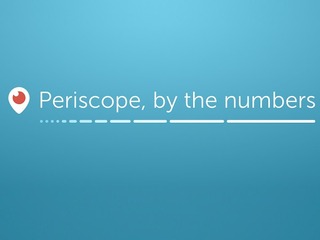DUOS expands AI capabilities to help seniors apply for assistance programs
It will complete and submit forms, and integrate with state benefit systems
Read more...
In the early days of the live-video wars, Periscope is the clear winner.
The Twitter-owned company celebrated its one-year anniversary over the weekend, and on Monday it revealed some new stats showing how far it has come in that short amount of time.
The app has now seen more than 200 million broadcasts created. On top of that, it also has over 110 years of live video watched every day across iOS and Android. That's only for live broadcasts, and doesn't even include time spent watching broadcasts within Twitter, at periscope.tv or replays.
In August of last year, the company said it had 10 million users, and was seeing 40 years of video watched a day, meaning that second number has nearly tripled in six months. So it's obviously growing quickly.
We didn't get an update on the first number, and I wouldn't expect to since the last time it released its metrics Periscope made it clear that daily active users and monthly active users were not the metric it wanted to go by.
"Optimizing for DAU/MAU doesn’t properly motivate our team to create a product that people love. Here’s why: if we were motivated to grow DAU, we’d be incentivized to invest in a host of conventional growth hacks, viral mechanics, and marketing to drive up downloads," it said at the time.
"This direction doesn’t necessarily lead to a better product, or lead to success for Periscopers. We hold ourselves accountable to Time Watched as an organizational measure because it reflects the kernel of our product, and our core values."
That being said, if Periscope had reached some kind of milestone, meaning 100 million users, I'm sure we would have heard something about it.
Competition
When Periscope first launched last year, its main competition was coming from Meerkat, an app that initially relied exclusively on Twitter. That meant that any live-streams would automatically be sent to the user's Twitter account, rather than giving users the option to post on other social networks.
That decision was likely a smart one for Meerkat in the beginning, but it eventually came back to bite it when Twitter cut the app off from its social graph following its acquisition of Periscope.
In the wake of that decision, many postulated that Facebook might buy Meerkat to compete against Twitter; that, of course, never happened and earlier this month the app revealed that it had pivoted away from livestreaming altogether, choosing instead to become a video social network.
So that means Periscope wins, right? Well, maybe for now, but two giants loom: Google and Facebook.
In December, Facebook started testing the ability for people to share live video on Facebook, and, in January, it began expanding the function to all of its users. In February it launched on Android. Facebook has over a billion users, and anytime it does anything it automatically becomes a major rival to whoever was doing it first.
Then there's Google, which owns YouTube, and which is reportedly planning to launch it's own livestreaming app, called YouTube Connect. That too could cause some headaches for Periscope, as YouTube is the largest video streaming site on the planet.
It has 128 million unique users every month in the U.S. alone, who upload 400 hours of content every minute. Nearly 59 of Internet users in the U.S. already have a YouTube account.
Periscope is growing, but even with Twitter's backing it's going to have some might big contenders to deal with very soon.
(Image source: medium.com)
It will complete and submit forms, and integrate with state benefit systems
Read more...The bill would require a report on how these industries use AI to valuate homes and underwrite loans
Read more...The artists wrote an open letter accusing OpenAI of misleading and using them
Read more...